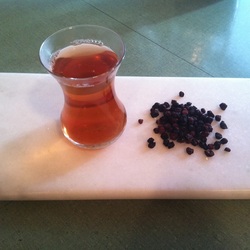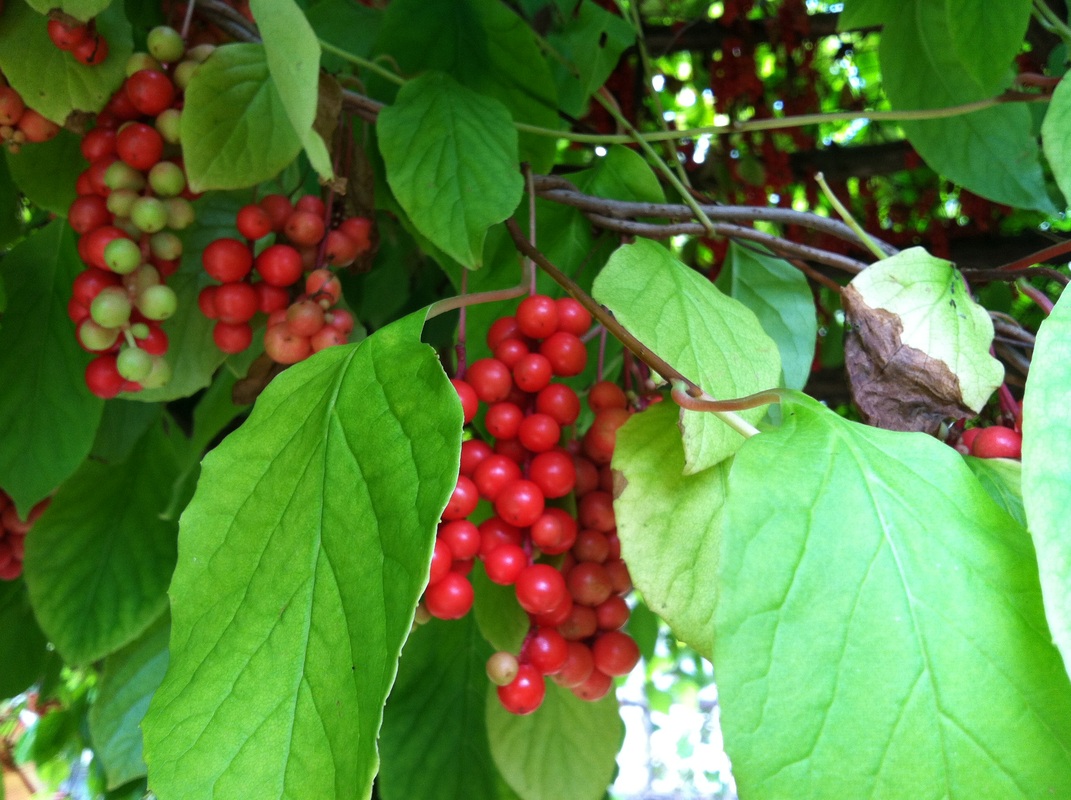 Schisandra (Schisandra chinensis) is a somewhat obscure herb that many people have never heard of before. Although it is indeed a relative newcomer to the Western herbalist’s pharmacopeia, it has been known, used, and loved by traditional Chinese herbal practitioners for thousands of years. A native of Asia, schisandra is a woody vine that produces bright red fruits at the end of summer; these fruits are then harvested and utilized for their extensive medicinal properties. But before we get into the medicinal uses of the unique schisandra berry, let’s talk about its taste… As I write this I am chewing on several dried berries and it’s as if a thousand sour fireworks went off in my mouth. Whew! To say that this plant is extremely flavorful is an understatement! I can taste the acutely sour and bitter notes as well as a peppery pungent taste. Chinese practitioners call it wu wei zi or “fruit of five flavors”, noting that schisandra incorporates all of the five tastes (sour, salty, bitter, sweet and pungent). Because of this distinctive quality it was thought to be an especially important tonic medicine. In classes I always remind my herbal students that a good way to become better acquainted with a new herb is to tune into its taste. Although we may not realize this simple fact, our taste buds can actually give us a lot of important information about a plant, i.e., how potent it is and how it could make us feel. Schisandra is a great example of how our tongue can give us clues about a plant’s medicinal action in the body. For instance, when I taste a few dried schisandra berries I immediately feel more awake and invigorated. The intense and sour taste is incredibly stimulating to my tongue (and, for lack of a better word, is very zing-y). It also clears away all other tastes and leaves my palate feeling cleansed. You can imagine that if this tart, little berry has such an invigorating and clearing effect on the tissues of the tongue, that it might have a very similar action on the rest of the body’s tissues and organs… Which indeed it does, according to traditional Chinese medicine where schisandra has been an important tonic herb for centuries – used to prolong life, slow the aging process, and increase stamina and energy levels. It was also believed that when used consistently over time, schisandra berry would cause one’s physical appearance to remain youthful. Scientific studies have validated the age-old regard for this plant, confirming that schisandra can help to reduce fatigue and also support mental concentration. Try chewing on a few dried berries or drinking the tea when you need to study for long periods of time or do focused work. The taste stimulates the mind and helps to keep your concentration steady and focused. Schisandra is also what we would call an adaptogenic herb, meaning that it helps to reduce mental and physical stress, increase energy, and enhance physical performance when taken over time. Not surprisingly, these qualities make it a great herb for athletes as it helps to increase endurance. However, even if you aren’t an athlete but want to improve your overall energy levels, schisandra can be beneficial. Even better, like many deeply colored berries, schisandra contains many protective antioxidants that help to maintain healthy cells throughout the body and reduce inflammation. Finally, another wonderful virtue of this plant is that it supports the liver. Schisandra is a hepatoprotective (liver-protecting) herb. It also exerts a gentle detoxifying action – remember how it makes your palate feel refreshed and cleansed? It has this same purifying effect for the liver, too. How to Use Schisandra: · To make schisandra berry tea at home, simmer 1 to 2 Tblsp. of the dried berries in 2 cups of water in a small, covered saucepan for 15 to 20 minutes. This will yield a much more medicinal and flavorful cup of tea than simply pouring boiled water over the herb. · Try using schisandra tea as an unconventional, but very effective, coffee alternative for an early morning jumpstart, or a caffeine-free energy boost in the afternoon. · Schisandra blends well with other herbal fruits such as hawthorn, elderberry and rosehips. You can also try substituting schisandra berry in any tea blend that would call for hibiscus. · Schisandra is also readily available in tincture form, which is convenient when you aren’t able to make a cup of tea. · Or, just chew on a few dried berries to reap schisandra’s benefits: start with one or two and work your way up. This article was originally posted on Cambridge Natural's blog. |
Categories
All
Archives
January 2022
|
